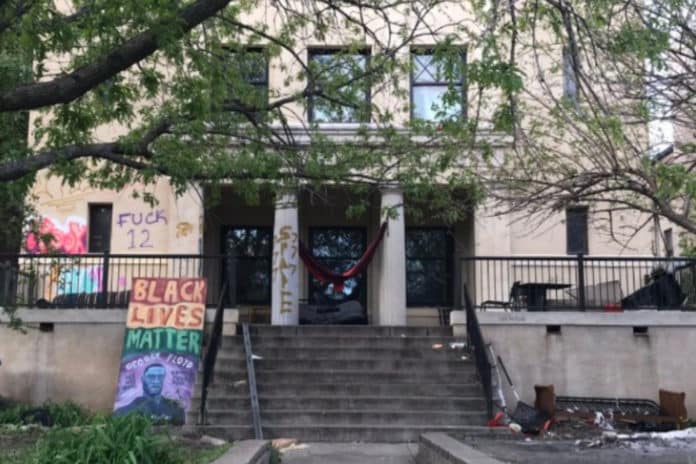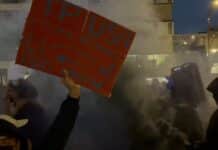A leader of the “left-wing radical group Antifa” has been living at the student co-op problem property on University of Minnesota frat row for a significant period of time over the last two years. The residence was the site of a shooting over the weekend and numerous violent incidents in the past few months.
That was the stunning revelation made at the Thursday morning meeting of the University of Minnesota Board of Regents Finance & Operations Committee, during which the problem property and campus safety were addressed.
University of Minnesota Police Chief Matt Clark confirmed the assertion after Vice Chair of the Board of Regents Steve Sviggum stated he’d received information from a credible law enforcement source that an Antifa leader had been living at the residence over the last two years.
The residence at 1721 University Avenue Southeast is nestled in the midst of the historic Greek housing district known as fraternity row, but is privately owned by Students Cooperative, Inc.
The property has been a source of violent incidents and disturbances for months. A 15-year-old boy was shot during a melee at the location early Saturday morning. His injuries were reported to be non-life threatening at the time. There has been no indication from police that any suspects have been identified or arrested in the shooting.
Myron Frans, senior vice president for finance and operations for the U of M, stated that the property is not in any way owned by or affiliated with the U of M. Frans said the residence offers “affordable housing” and has been used as student co-op housing since the 1940s. However, he stated that no students have been living at the residence for several months.
Clarification was offered during the meeting about photos of a document being circulated online that appears to show the U of M on a mortgage agreement with the co-op. Frans stated that the U of M Foundation of Real Estate Advisors (UMFREA) previously loaned the co-op $100,000 through the “Greek Loan Program.” The loan was issued in August 2018 and stipulates that the loan is to be paid off over 15 years.
U of M general counsel Doug Peterson explained during the meeting that UMFREA decided it would be “beneficial” to loan the money to the co-op even though it wasn’t part of the Greek fraternities or sororities.
Frans said that although the co-op is current on payments toward the loan, UMFREA is seeking to document violations of the terms of the loan in order to start foreclosure proceedings, which, once started, could take up to nine months. The loan terms state that the property must be maintained in good condition and free from “misuse.”
Frans said the university is seeking pathways to stop the dangerous behavior occurring at the property and potentially change the use designation of the property going forward.
Frans said the U of M made requests to the co-op owners as far back as February to clean up the graffiti and address disrepair issues at the building.
In May, U of M police installed a pole-mounted camera in front of the building and auxiliary lighting in the back as a safety measure. Frans also stated that the university has installed and is paying for “24/7” private security at the residence. Frans later clarified when questioned that the private security is contracted for ten days — presumably since the weekend shooting.
The building has been boarded since after the weekend shooting and no access is being allowed. Minneapolis homicide investigators obtained a search warrant for the residence immediately following the shooting, but there was no expansion on what may have been found during the search warrant investigation.
The student co-op board filed an eviction action in Hennepin County court two weeks ago seeking to evict residents they claim are squatting in the property. The co-op received court approval to evict the squatters last week and notice was served by the Hennepin County Sheriff’s Office on June 3, hours before the melee and shooting.
On June 7, the student co-op board posted a notice on their website stating that they learned last fall that “the house’s cooperative governance collapsed during the beginning of the COVID-19 pandemic, and continued to deteriorate as member residents moved out of the Co-op.” They further stated that as residents moved out, squatters and non-members took over the property.
Frans indicated the next steps will involve UMFREA further working to document breach of contract issues to move forward with a foreclosure action. The university is seeking to have the property condemned and that will involve working with the city to discover and document possible issues and generate citations.
Campus area crime and the state of UMPD
UMPD Chief Clark updated the board on campus area safety and the status of his department. Clark stated that his force is down to 48 officers from 56 the last time he debriefed the regents. He said his department is “stretched thin” with officers being assigned to Dinkytown every night since last August, as well as offering security escort services to people who request them.
Clark said that “on-campus” crime has remained steady for several years. However, he said that “off-campus” crime has increased nearly 45 percent. In 2018 to 2019, off-campus areas experienced about 300 incidents of violent crime. In 2020 to 2021, Clark said that number grew to 450 to 500 incidents of violent crime. Clark stated he expects that number to remain about the same this year.
Chief Clark stressed to the regents that UMPD is “partners” with other city and county agencies, like MPD, and is asking for their help. Clark noted that had Hennepin County and Minneapolis not stepped up to help immediately in recent events, “it would be a different picture today than it is right now.”
Clark also expressed emotional words of disappointment for how officers have been treated in the last two years “from parts of the university” but acknowledged that President Joan Gabel and the board have expressed appreciation for the department.
Clark said four young officers recently started with the department, but three have already quit citing the acrimonious environment. Clark said it will be hard to retain officers in that environment.
“How are we treating university officers?” Clark asked the board. “Are we treating them like Minneapolis [police]?” he continued, citing the “toxic environment” remaining officers in Minneapolis have faced. “When it comes to recruitment, that is the key.”
– – –
Minnesota Crime Watch & Information publishes news, info and commentary about crime, public safety and livability issues in Minneapolis, the Twin Cities and Greater Minnesota.











